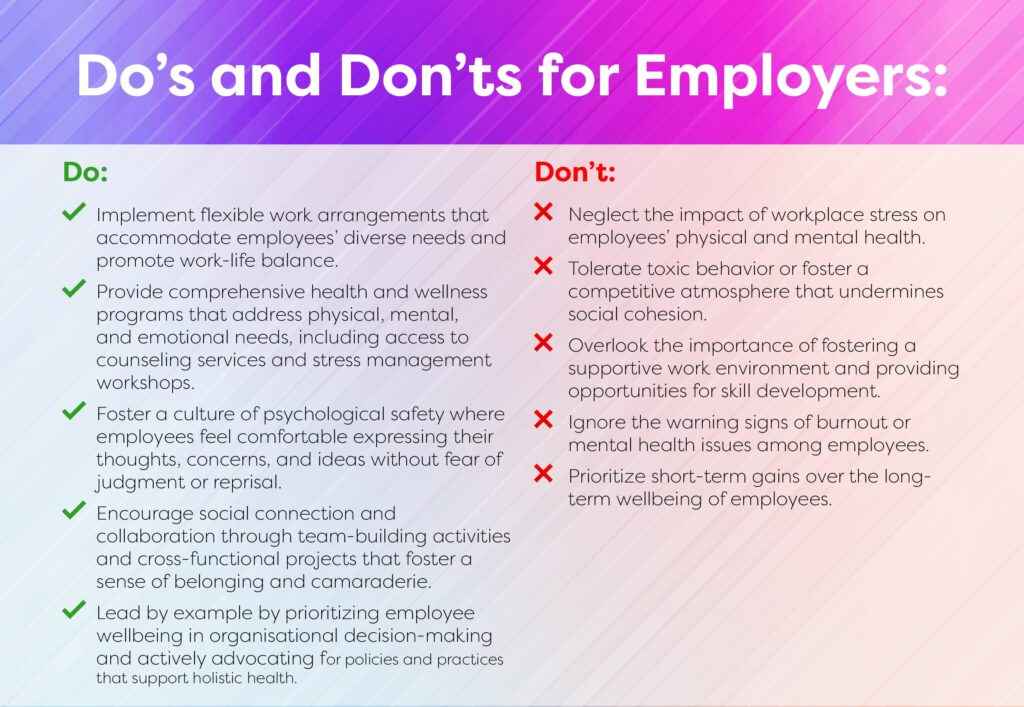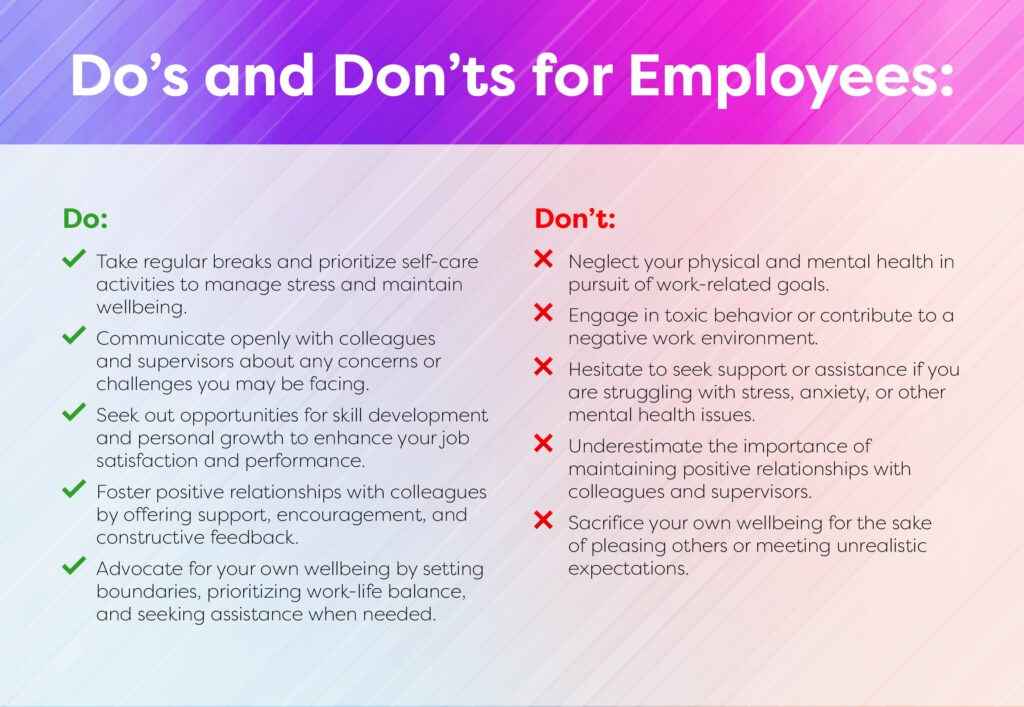
In today’s corporate landscape, the relentless pursuit of productivity, results and organisational profit often overshadows the significance of employee wellbeing. Unfortunately, both employers and employees frequently overlook the critical importance of holistic health in the workplace and its positive impact on business and organisational success. However, by recognising the intricate interplay between psychological wellbeing and organisational success, companies stand to gain significanctly, while also ensuring the happiness, productivity, and job satisfaction of their employees.
One of the paramount considerations in discussions regarding workplace wellbeing is the impact of stress. Undoubtedly, stress ranks as the primary issue reported within work environments, frequently resulting in psychological and physiological burnout. Such burnout often correlates with diminished productivity levels and can ultimately manifest in physical ailments.
This phenomenon is deeply rooted in the physiological responses triggered by workplace stressors. For instance, chronic stress prompts the release of cortisol, a hormone associated with the body’s fight-or-flight response.
Prolonged exposure to elevated cortisol levels not only detrimentally affects workplace productivity but also poses risks to employees’ health, including hypertension, compromised immune function, and heightened susceptibility to cardiovascular disease.
It is imperative for employers to grasp that prolonged exposure to these stressors can lead to the resignation of talented employees, resulting in potential loss of profitability to the organisation. This creates a cyclic relationship wherein employee wellbeing significantly influences organisational success, and conversely, organisational expectations impact employee wellbeing. The direction of this relationship can either foster a positive or negative outcome, underscoring the critical importance of addressing stress and promoting employee wellbeing within the workplace.
In psychology, various theories of motivation provide frameworks for understanding and promoting wellbeing in the workplace. Maslow’s Hierarchy of Needs is one such theory that offers valuable insights into the relationship between employee motivation and wellbeing. According to Maslow, individuals have a hierarchy of needs, starting from basic physiological needs and progressing to higher-level needs such as belongingness, esteem, and self-actualisation. This theory suggests that meeting employees’ diverse needs is essential for fostering their overall wellbeing and motivation in the workplace.

By linking Maslow’s theory to motivational theories such as Self-Determination Theory (SDT) and Goal Setting Theory, organisations can create environments that support holistic health and wellbeing among employees.
SDT emphasizes the importance of fulfilling individuals’ intrinsic psychological needs for autonomy, competence, and relatedness. When employees’ basic needs for autonomy and relatedness are met, they are more likely to experience greater satisfaction, engagement, and overall wellbeing in their work. Similarly, Goal Setting Theory highlights the significance of setting clear and challenging goals in driving motivation and performance. By providing employees with meaningful goals aligned with their needs and aspirations, employers can enhance their sense of purpose, direction, and psychological wellbeing in the workplace.
Finally, Equity Theory underscores the importance of fairness and equity in organisational practices, particularly in the distribution of rewards, recognition, and opportunities. When employees perceive fairness and equity in their treatment, they are more likely to experience greater job satisfaction, trust, and overall well being. By promoting fairness and transparency in decision-making processes and fostering a culture of inclusivity and respect, organisations can enhance employees’ psychological wellbeing and motivation to thrive in the workplace.
Incorporating insights from these motivational theories into organisational practices not only enhances employees’ psychological wellbeing but also contributes to their overall holistic health and performance. By recognising and fulfilling employees’ diverse needs, providing meaningful goals and opportunities for growth, and promoting fairness and equity in the workplace, organisations can create environments where employees feel valued, empowered, and motivated to achieve their full potential.

The consequences of employers’ decisions regarding workplace health and wellbeing extend beyond individual employees to impact organisational performance and reputation. High turnover rates, absenteeism, and decreased productivity are common outcomes of neglecting employee wellbeing and signs of burnout. Moreover, organisations that fail to prioritise employee health risk reputational damage and legal liabilities.
Conversely, organisations that invest in holistic health and wellbeing initiatives reap numerous benefits, including increased employee engagement, enhanced creativity and innovation, and improved organisational resilience. Therefore, employers should recognise the importance of employee wellbeing as a strategic imperative and integrate it into their organisational culture and practices.
Numerous studies have demonstrated the positive effects of employee wellbeing on organisational success. Research conducted by Gallup (2013) found that companies with highly engaged employees outperform their competitors by 147% in earnings per share.
Additionally, a study published in the Journal of Occupational and Environmental Medicine showed that companies with comprehensive wellness programs experienced a 25% reduction in absenteeism and a 40% reduction in healthcare costs. These findings underscore the tangible benefits of investing in employee wellbeing for both individual and organisational outcomes.
In the words of Richard Branson, “Clients do not come first, employees come first. If you take care of your employees, they will take care of the clients.” This sentiment encapsulates the fundamental principle that employee wellbeing is the cornerstone of organisational success.
By prioritising the mental and physical health and happiness of employees, organisations can create a positive work environment where individuals thrive, productivity soars, and customer satisfaction flourishes.